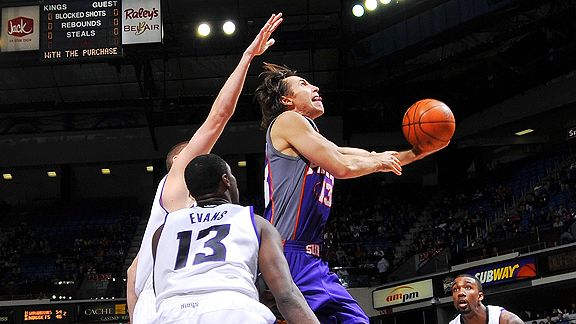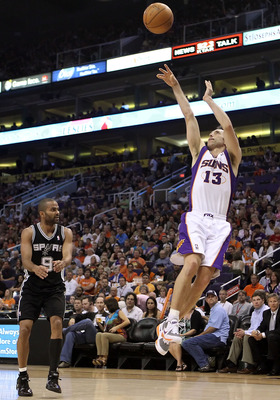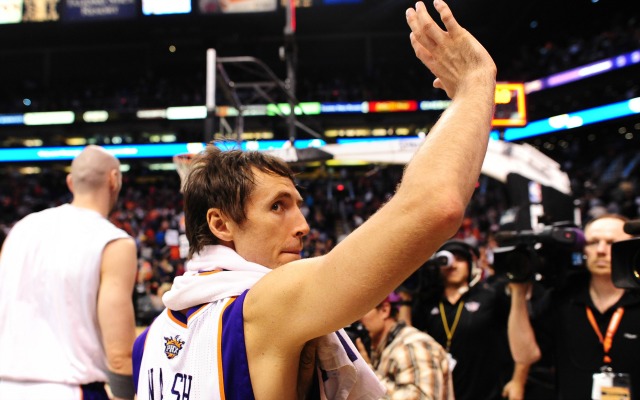The year was 1996. The Chicago Bulls stampeded their way to
a 72-10 record while earning Michael, Scottie, and Phil their fourth
championship. With Michael Jordan back from his premature retirement and back
on his NBA throne, it certainly appeared that great things were on the horizon
for the League. Although I don’t think anyone could have foreseen what would be
arriving that summer.

In 1996, the NBA ushered in a class of rookies that would
feature three future MVPs. One of those MVPs—also the number one overall pick
in this draft—retired in 2013, which led to a piece where I gushed about his impact
on the NBA culture. The 13th pick in this draft would go on to win
an MVP as well, on his way to winning five NBA championships. That player is
suiting up for at least one more season. However, despite the dynamic scoring
prowess of those two MVPs, it would be the 15th pick of the draft that
ended up walking away with the most MVP awards. That player was an unassuming 6’3”
point guard out of Santa Clara University and he would go on to record the
third most assists in NBA history. That player is Steve Nash, and in March 2015
he officially retired from the game of basketball. And nobody cared.
Perhaps that last sentence is a little dramatic. After all,
keeping it in true Steve Nash fashion, the announcement itself was low key, an
essay Nash published through the Player’s Tribune. However, even with the way
he quietly left the game, it seems so strange to me that more people weren’t
talking about the career of a surefire Hall of Famer. Instead, it seemed as if
most people heard the news, briefly acknowledged it, and moved on with life.
A lot of this has to do with his final few seasons on the
Lakers, which can only be described as a complete fucking disaster. And
unfortunately, the NBA is certainly a “what have you done for me lately?”
business. In Nash’s case, he is (unfairly) associated with being the catalyst
that drove the Lakers to their currently abysmal state. In order to acquire the
aging point guard, the Lakers traded four future draft picks and signed him to
a three-year $28 million dollar contract. After suffering a broken bone in his
leg during the second game of his LA tenure, Nash fell victim to numerous setbacks
and a debilitating nerve injury that would cause him to miss 99 regular season
games with the Lakers. To compound this, it was
announced that Nash would be missing the entire 2014-2015 season after yet
another setback.

While Nash was essentially invisible to the rest of the NBA
landscape during his tumultuous tenure in Los Angeles, this shouldn’t be enough
to eclipse a career that epitomized unselfishness and team play. While Mike D’Antoni
is credited for revolutionizing how offenses currently play in the NBA, it
simply would not have worked the same without Steve Nash as the point guard. Of
course I’m referring to the famous Seven Seconds or Less Phoenix Suns teams
from 2004-2010 (their last playoff appearance with Nash). It was also during
this run that Nash won his back-to-back MVP awards, making him one of ten
players to accomplish this in history. While I’ll admit that both MVP awards
are, and were even at the time, controversial, it can’t be ignored how much Nash
was able to get the most out his teammates. Hell, even while in Dallas, Nash
helped drive the Nelly-ball Mavericks towards the upper echelon of the competitive
Western Conference.

What people are really going to forget is the uniqueness of
Steve Nash. While Nash’s passing and ability to run an offense should certainly
be the first thing that comes to mind, his scoring will likely be an
afterthought. If you take away his initial run in Phoenix (also plagued by
injury) and his years in LA, Nash averaged 15.1 points per game while shooting
about 49% from the field, an absurd 43% from three, and an “I can’t believe I’m
typing this” 97% from the free throw line, over a 14 year stretch. In fact,
over his entire 19 year career, Nash is the most accurate free thrower shooter
of all time at 90%. While his accuracy literally almost made me fall out of my
seat just now, it was how he shot the ball that people should remember. Steph
Curry is currently blowing people’s mind with his ability to accurately shoot
the ball while moving, which as most basketball players know is extremely
difficult. However, Nash was arguably the first one to master shooting the ball
in such a manner. Obviously no one has ever shot the ball from the range that
Curry can, but Nash’s ability to be unpredictable and accurate with his shot
was as crucial as his passing ability when running D’Antoni’s and Alvin Gentry’s
offenses (I highly doubt it’s a coincidence Gentry happened to be an assistant
coach for the Warriors last season while Curry was doing a very rich man’s Nash
impression. It’s also not a coincidence Nash is taking on a part time coaching
role with the Warriors this coming season).

Of course, Nash’s playmaking and ability to elevate his team
is his defining traits, as evidenced by his 10,335 total assists, which again is
good enough for the third highest total ever. While his MVP run from 2004-2006
should be considered the highlight of his career, to me, his run to the 2010
Western Conference Finals is his defining moment. At age 35, with his history of
back injuries flaring up throughout the year, he managed to finally beat his nemesis,
the San Antonio Spurs, and came within two victories of taking his team to the
Finals, only to fall to the defending champions and his future team, the Los
Angeles Lakers. During that run, Nash averaged 17.8 points, 10.1 assists, shot
51.8% from the field, and recorded a 22.4 PER. Again, at age 35. His teammates
Jason Richardson and Amar’e Stoudamire seemed rejuvenated during this playoff
run and no named—at the time—role players such as Jared Dudley, Goran Dragic,
and Robin Lopez, would use this run to spring board towards better contacts and
became valuable members of future playoff teams. The success of those players is almost a direct result of playing with Nash. After this playoff run, Bill
Simmons changed Steve’s all-time ranking in the paperback version of the The Book of Basketball, slotting him at
number 35, which is one spot ahead of Allen Iverson and as the sixth best point
guard behind Magic, Oscar, Cousy, Isiah, Stockton, and Walt Fraizer (and Sam
Jones if you consider him a point guard. Also worth noting that book was
published before the 2011 Mavericks won the championship, which likely elevated
Jason Kidd’s ranking). Of course, management blew up that promising team and
Steve Nash’s championship window slammed shut for good.

Which is maybe why we aren’t thinking about Nash as much as we should, and really points to a larger problem we have when talking about
sports and great athletes. There are six MVP’s that have not won a
championship: Nash, Karl Malone, Charles Barkley, Allen Iverson, Kevin Durant, and
Derrick Rose. With the exception of Derrick Rose, all those other players at
least played in the NBA Finals, except for Steve Nash. What’s interesting is
that Barkley and Malone get somewhat of a pass because they played in the same
era as Jordan. Iverson ran up against the greatest playoff team ever in the
Finals and never had even a good supporting cast. KD and Rose are still
currently playing, and both are on teams that can definitely make a run to the
Finals. The point is all these players get some sort of a pass, so why should’t
Nash? After all, he played his entire career in the Western Conference during a
time where Shaq, Kobe, Duncan, and Dirk all won titles. Not to mention his best
team (2007 Suns), and best chance of making the Finals, was royally screwed
after Stoudamire and Boris Diaw were suspended for leaving the bench to defend
Nash after Robert Horry did everything short of giving him a Stone Cold Stunner
during the playoffs. Hell, even their 2010 team was a Ron Artest putback away
from going up 3-2 in the series with a chance to clinch in Phoenix. Even while
going against those aforementioned Hall of Famers, Nash still somehow always
managed to put his team in a position to compete. Whether it was a Robert Horry
hip check, or a putback layup, or an errant knee collision with Damian Lillard,
it just seemed as though Steve could never catch a break.
As a Lakers fan, I totally admit that I was just as
frustrated with Nash and his injuries as everyone else that followed the team.
But not even that situation can allow me to dismiss an incredible career. And
with only one last member of that fabled draft class remaining, I certainly
gain more of an appreciation for Nash and what he managed to accomplish despite
having his career nearly end before it was started. He changed the way athletes
take care of their bodies, he cranked up the pace of the game, he arguably
sparked the basketball revolution that’s currently brewing in Canada, and
despite all of his accomplishments remained honest, humble, and a man of integrity.
Steve, it’s been real, thanks for the memories.

Stats, Photos, and other shit courtesy of:
The Book of Basketball by Bill Simmons (paperback)
No comments:
Post a Comment